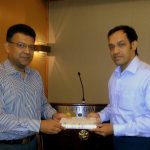- August 3, 2013
- Posted by:
- Category:BLOG, Speaker Events
Stock broking has witnessed tremendous growth in the past 135 years. “Starting from under a banyan tree way back in 1875, the stock broking industry today is scaling newer heights where trades are executed in nanoseconds” stated Leopaul George, founder Vanguard Equities at the Speaker Event held by IAIP at Chennai on the Past, Present and Future of Stock Broking. The event held on July 25th was well received by the members. Following a summary of this event.
The session was divided into three sections—
- Past – the pre-1994 era
- Present – 1994 till today
- Future – What is in store for tomorrow
George started with the history of stock broking in India from its roots—starting from under a banyan tree in 1875. One interesting tidbit he shared was that a seat in the exchange cost ₹1 about a century ago and the same cost around ₹4 crore in 1990s. It was a time when the regulator, Controller of Capital Issues (CCI), had no teeth and this lead to a lot of IPOs being issued, only to go bust. He went on to describe how the other stock exchanges (DSE, MSE, ASE, CSE etc) worked and how they were linked to BSE through PTI terminal where data showed up with a 15-20 minute delay. In the late 1980s and early 1990s, there weren’t many who had telephone connections and those who did, were able to earn millions in profits; thanks to the delay in information transfer from the BSE to the local exchanges. Another interesting fact that he shared was that the markets were only open between 11am and 2pm. The entire stock market ran on trust and there were no brokerage firms, just individual brokers. He also described how the face to face deal making happened, how physical negotiation was the norm, how panic trades were managed and how a good broker had the status of a demi-god. It was an era where stock brokers had the power to move markets and this was reflected in one the years where the brokers wanted to get ACC share to 10,000 for Harshad Mehta’s birthday and they succeeded in achieving that mark. Other significant events that marked the pre-1994 era included the IPO of Reliance Textile in 1977, formation of BSE Sensex in 1986, opening up of economy in 1991, Harshad Mehta scam in 1992 and the formation of SEBI as well as the bombings in Bombay in 1993.
The formation of NSE paved way towards a new era in the stock market. As George mentioned, ‘geography became history’. NSE really fought against the established Bombay Club of brokers and won. Demat format, electronic and online trading was introduced and it started to gain momentum in the early 2000s. Despite the inroads created by the NSE in the stock market, the transactions were very less in the 1990s and 2000s as compared to today. For instance, the average turnover of a single day presently is equal to that of 1 year transaction in 1993 and two day turnover today is equal to that of 1 year transaction in 2002. However, it needs to be noted that today’s transactions also include derivatives which wasn’t prominent in the early 2000s; but still, the above statistic is illustrative of the difference in trading activity between early 2000s and today. Another key change that was witnessed in the post 1994 era was the creation of corporate brokerage firms. Individual stock brokers such as Motilal and Uday Kotak became corporate houses. The markets also witnessed the entry of FIIs who later on assumed a driver’s seat; thanks to their deep pockets and ability to move the market and global connections. This period also saw the evolution of settlement dates. Settlements were weekly in NSE and bi-weekly in BSE and it progressed to T+5 in 2001 and T+3 in 2002. Other significant events that marked this era were the dot com burst, the Katen Parek scam and the introduction of derivatives in 2000.
George’s take on the changes expected in the future included the following:
- Bank account portability (similar to mobile number portability),
- T+1/T+0 settlements,
- Weather derivatives,
- Placing orders through social media,
- Transaction based brokerage and
- Safety net for all IPOs (similar to the one witnessed in the Just Dial IPO).
George also went on to describe a typical day in a broker’s life, which included being alert for almost 24 hours a day (foreign markets have the potential to impact the Indian market; hence, it is important to keep a track of them). Q&A covered attributes of a good broker and characteristics of sub jobs at broking firm, possibility of making money in trading, and few insights on requirements to become a broker and entry level barriers to start a brokerage firm. The session ended with a networking dinner.
Contributed by: Meera Siva and Bharath M
Photographs by: Volunteers


Reblogged this on singhmublog.
Thanks for share this.